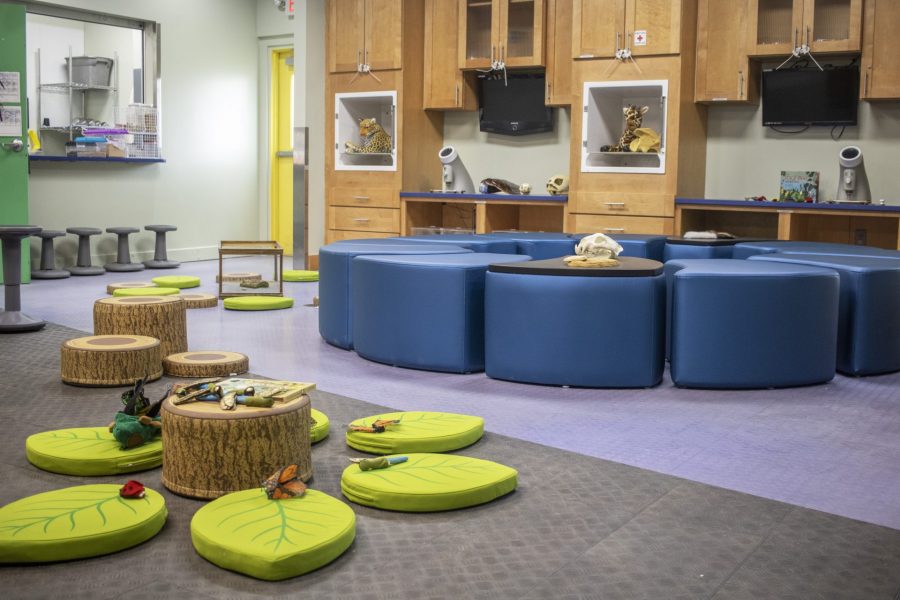Summary of Renovating the Wildlife Discovery Hub:
The Brevard Zoo has renovated and renamed its indoor space, previously called the Wildlife Detective Training Academy, to the Wildlife Discovery Hub (WDH). The project was made possible by a gift from the late Charles Marzzacco’s family and friends. The WDH will be used for education programs such as summer camps and field trips. It features flexible seating and live-streaming capabilities for real-time communication with the Sea Turtle Healing Center. The WDH is also home to various species of animals, referred to as “animal ambassadors,” who serve as educators for their respective species. The habitats have been upgraded to mimic natural environments, providing the animals with a better quality of life. Visitors can meet the animal ambassadors by participating in education programs, attending Zoo Chats, or following the Zoo on social media.
*****
– Introduction of the Wildlife Discovery Hub (WDH) and its importance in education and conservation
– Details of the renovation process and the collaboration between different departments
– Description of the unique learning environment in the WDH, including flexible seating and live streaming
– Introduction of the animal ambassadors that call the WDH home
– Explanation of the improvements made to the animal habitats during the renovation
– Opportunities for visitors to interact with the animal ambassadors
– Highlight the importance of supporting the Brevard Zoo’s conservation efforts
The Wildlife Discovery Hub (WDH) at the Brevard Zoo has recently undergone an incredible renovation thanks to the generous support of the family and friends of the late Charles Marzzacco. This project aimed to create a functional and appealing space for teachers to engage their students and inspire a love for science in children of all ages.
The renovation of the WDH was a collaborative effort between the Zoo’s Animal, Education, and Maintenance Departments, each playing a crucial role in transforming the space into what it is today. The goal was to improve the animal ambassadors’ habitats and create a modern learning environment that meets the needs of 21st-century students.
One of the critical features of the WDH is the incorporation of flexible seating, which allows students to control their learning environment by selecting where and with whom they work. This approach promotes collaborative learning and the development of communication and higher-order thinking skills. Additionally, learners using the WDH will have the unique opportunity to live to stream into the Sea Turtle Healing Center, facilitating real-time conversations with the team caring for sick and injured local sea turtles.
The animal ambassadors that call the WDH home play a crucial role in educating visitors about the importance of their species in the natural world. Each resident is an ambassador for their species, from corn snakes and bearded dragons to pancake tortoises and blue-tongued skinks. By housing them in a non-public area, the Zoo can provide them with natural rest days, allow them choice and control over their participation in programs, and create different training opportunities.
During the renovation of the WDH, the animal care team focused on upgrading the habitats for all 22 residents, particularly the reptiles. The team created more naturalistic habitats with live plants, improved basking areas, accurate humidity changes, and increased overall space. These enhancements ensured that the habitats mimic the natural ranges of each species, promoting their overall well-being. The habitats automatically adjust their light fixtures to mimic natural day and night cycles.
Visitors who are interested in meeting the animal ambassadors have several options. They can sign up for an education program at the Zoo, where they can interact with these fantastic animals. Additionally, the Zoo offers daily Zoo Chats at the Front Entrance Plaza, during which the animal ambassadors are brought out for visitors to learn from and enjoy. The Training Tales Chat in the Lands of Change Theater is another opportunity to meet these incredible creatures.
Generous donations are needed to support the Brevard Zoo’s vital animal wellness, education, and conservation programs. As an independent, not-for-profit organization, the Zoo relies on public support to continue serving the community and making a difference in wildlife conservation. Individuals can help inspire future scientists and educators by contributing to the Zoo’s efforts.
In conclusion, renovating the Wildlife Discovery Hub at the Brevard Zoo has transformed the space into a unique learning environment that inspires curiosity and fosters collaboration. It promotes the appreciation of the natural world. The animal ambassadors that call the WDH home serve as important ambassadors for their species, educating visitors about the importance of conservation. By supporting the Zoo’s conservation efforts, individuals can contribute to the future of wildlife and encourage the next generation of scientists and educators.

